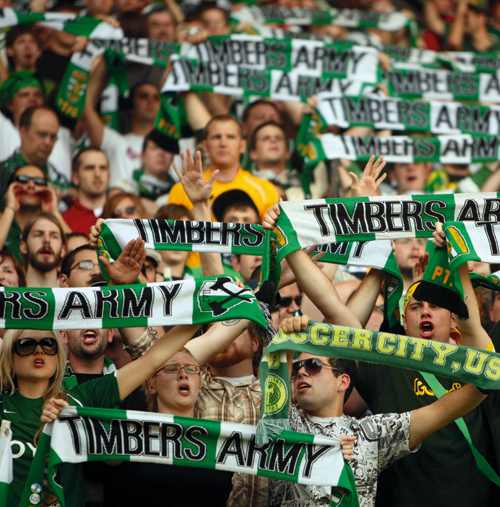 It’s the color of the shirts, the grass in the revamped stadium and the money locals hope will flow from the new MLS franchise.
It’s the color of the shirts, the grass in the revamped stadium and the money locals hope will flow from the new MLS franchise.
BY KRISTEN HALL-GEISLER
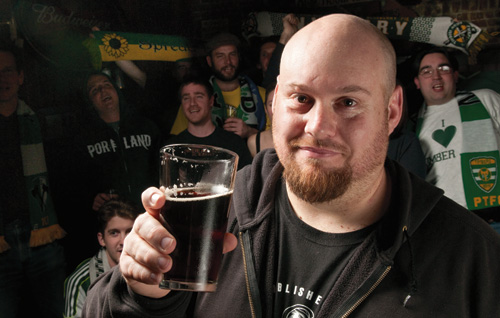 |
Dylan Bird owns The Bitter End Pub, unofficial home of the Timbers Army, whose ranks have swelled as PGE Park across the street from his pub has added seats and season tickets. // PHOTO BY MATTHEW GINN |
The woman with the crosscut saw across her shoulders stares down at the city. A green circle logo with a double-headed axe is in the corner to the left, with “Spring 2011” nearby. The billboard is massive. You can see it in her eyes and the eyes of every other member of the Timbers Army who is ready for the 2011 Major League Soccer season: There’s no pity in the Rose City. And when the Portland Timbers home games begin on April 14, local businesses are hoping to see green — and not just in the grass on the pitch.
Timbers owner Merritt Paulson expects the completely remodeled PGE Park, now named Jeld-Wen Field, to bring $30 million to local businesses and create 300 long-term jobs. It’s a promise he’s willing to back up — he was the owner of the Timbers as a minor-league team, and it cost $36 million (with the city putting in $12 million) to upgrade to owning a Major League Soccer franchise.
The Timbers’ front office estimates that stadium revenues alone will bring in around $14 million each year from the 2011 inaugural season through 2015; the average MLS team’s revenue is $13.83 million. All but three MLS teams increased their season ticket sales from 2007 to 2008 (the data used by the reporting firm, HVS Convention and Sports Entertainment), and the league average is a 26.6% increase. The Timbers surpassed 12,000 inaugural season tickets sold on March 7, and made 500 additional season tickets available. MLS takes a third of the base ticket revenues, but the new Jeld-Wen Field is expected to bring in $3 per person in merchandise and $8 per person in concessions — or about one large Widmer Brothers’ Hefeweizen with a lemon.
Paulson also owns the mostly defunct Portland Beavers, which ranked last in AAA baseball attendance for their final season in 2010. All signs point to Paulson selling the franchise in the near future, as they are currently without a place to play. As Dylan Bird of the Bitter End Pub across from the stadium says, “Losing the baseball games would have sucked if people went to games in the last few years.”
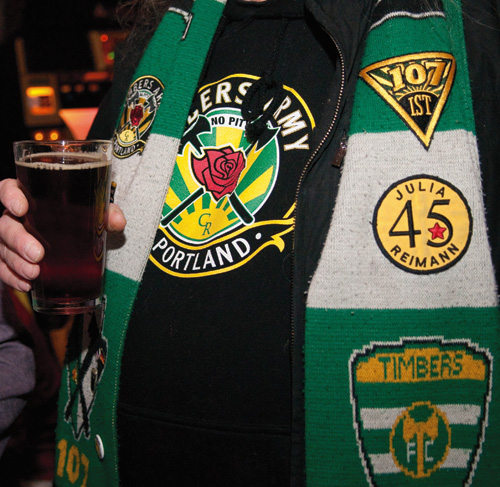 |
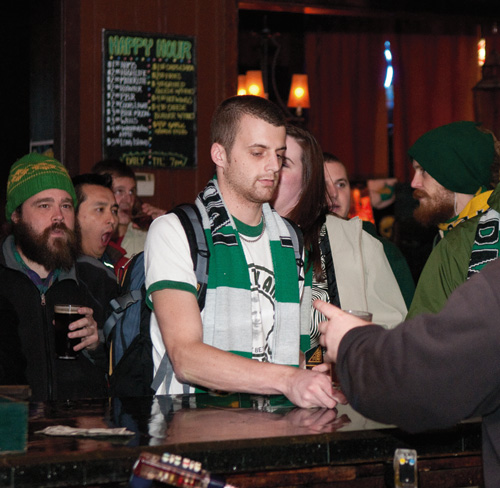 |
The Timbers Army in force at the Bitter End (pictures above, by Matthew Ginn) and at games. The Army shows its devotion with chants like, “We are Timbers Army/We are mental and we’re barmy.” |
 |
Anyone who’s been to a Timbers game knows the Timbers Army. These are the folks who occupy section 107 behind the home goal, armed with chants, drums, rally scarves and energy to rival the players on the field. The “107ist” formed two years ago, as the push to move the Timbers to the major leagues began. Fans got together to lobby city hall to remodel the old PGE Park, and the formal 107ist organization was born from that effort. The 107ist is a nonprofit Independent Supporters Trust — thus the “ist” in the name — a concept that comes from European soccer culture. It now boasts more than 650 members.
The 107ist worked out a deal with the Timbers for selling season tickets in the Timbers Army section of the new stadium. For each $360 season ticket sold, the 107ist collects $10. It’s a deal similar to what youth soccer leagues used to get in the Timbers’ minor league days, with the front office not actively selling seats in the section. This, plus proceeds from sales of shirts, scarves, bus trips to away games, and more, funds efforts to improve soccer in Soccer City USA. “Anything we generate will go back into the community,” says Garrett Dittfurth of the 107ist.
The Timbers Army and 107ist have already saved Jefferson High School’s soccer program. “We got them uniforms, equipment, and shoes for the men’s and women’s teams,” Dittfurth says. The organization has also worked with Harper’s Playground, a nonprofit that aims to build a wheelchair-accessible play area for Arbor Lodge Park.
If you’re still confused about the difference between the Timbers Army and the 107ist, Dittfurth offers this: “Timbers Army is the party; the 107ist is the people who plan the party.”
Dylan Bird is the owner of The Bitter End Pub, which is the unofficial bar of the Timbers Army. He can’t see how the Timbers’ move to the major leagues could be anything but positive for his business across the street from Jeld-Wen Field. “We always did well at soccer games; I assume we’ll continue to do well. It’ll help everybody around the neighborhood.”
Given its location on Burnside Street, there’s not much Bird can do about the size of the bar, but he will do his best to accommodate the new fans that come in. He plans on adding to the beer selection at the makeshift second bar he sets up for home games and streamlining the menu so the cook in the tiny kitchen can keep up.
Bird expects the game-day rush will start earlier and last longer now that thousands of seats have been added to the stadium. Traditionally, Timbers Army people would pay their tabs and head for the stadium a half-hour before kickoff to set up. “New season-ticket holders might not know what the big deal is about kickoff and linger for an extra beer,” Bird says.
Preferred bar of the Timbers Army or no, Bird isn’t worried about competition in the neighborhood. “If I’ve got 200 people, I’m probably over the fire code, and that’s less than 1%” of the 20,000-plus seating capacity at the new stadium. He predicts bars as far away as NW 23rd Avenue will be filled for home games.
It’s not just business owners who benefit — employees will get their share of Timbers green, too. Restaurants and bars will have to beef up staff on game day, and anyone working those shifts will likely see more tips. “In addition to being busy on game day, servers go out on Sunday and Monday,” Dittfurth says. They’ll be spending the money they earn from Timbers fans at other establishments across the city.
A Timbers fan himself, Bird bought season tickets last summer. Then he realized he’d never get to use them — his bar will be too busy on game days for him to leave.
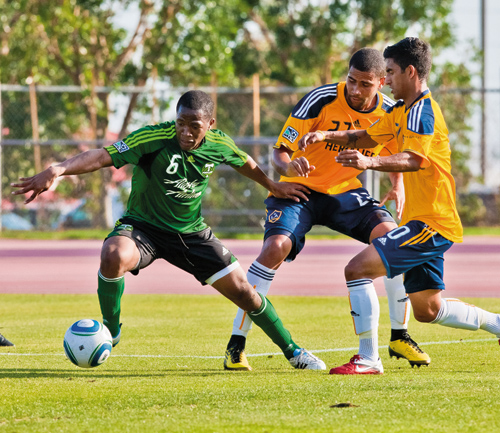 |
Timbers forward Darlington Nagbe (jersey designed by Adidas in Portland) plays against the LA Galaxy during a preseason match Feb. 8 in Carson, Calif. |
Sometimes, you don’t need a season ticket to see the Timbers play a little “futbol.” League-wide sponsor Adidas now has a major-league team in its own back yard — sometimes literally. While waiting for Jeld-Wen Field and the Adidas Timbers Training Center in Beaverton to be completed, the Timbers practiced on the small pitch behind Adidas’s North American headquarters on Greeley Avenue. Employees who had designed the team’s jerseys and shoes got to see the new gear come alive outside their office windows.
“The Timbers have been a fantastic organization to work with,” Adidas soccer business unit director Antonio Zea says. “We can’t play favorites, but by fact of proximity, we link with the team as much as possible.” Adidas has hosted press conferences with the Timbers to raise awareness of the team, the league and the brand. “People don’t know our headquarters is in Portland,” Zea says.
As the leading global soccer brand, Adidas is working with MLS to raise soccer’s profile in this country through sponsorship of local tournaments and clubs. The majority of soccer products sold by Adidas are to youth, according to Zea. “If you look at the pyramid of who’s playing, the base is 8- to 12-year-olds.” If these kids or their parents then decide to buy jerseys like their favorite pro players wear, all the better. And while Zea couldn’t confirm that the Timbers green home jersey was the best-selling jersey in MLS these days, he did say it’s a “top seller” with a proud grin.
Across the front of that green jersey are the white letters of the Timbers’ sponsor, Alaska Airlines. “This is the biggest sponsorship in our history, without exception,” says Alaska’s managing director of marketing and communications Greg Latimer. “It was not an overnight decision.”
When MLS announced in March 2009 that the Timbers would be an expansion team, sponsorship of the team was on the airline’s radar, but “our financials were not in place at the time,” Latimer says. “It became more front-burner when we realized we had a problem in Portland. We were not performing as well as we should as an airline, financially.” Sponsorship of the Timbers, a community-minded sports organization with a rabid fan base, “allowed us to tell the Portland market ‘you matter to us,’” Latimer says.
The sponsorship extends beyond the season, with marketing efforts like painting an airplane with the Timbers colors and logo. Alaska Airlines signed a four-year deal with the Timbers, and the 2,300 Alaska Airlines employees in the Portland area are thrilled. “Even the non-soccer people are buying jerseys,” Latimer says.
All this brand visibility, including a billboard on Interstate 84, could generate what’s known as “activation” in sponsorship circles. The hope is to sign more travelers up for Alaska and Horizon credit cards and frequent-flier programs. The airline is doing its part to continue the community connection, too, by sponsoring Corners for Kids, which donates up to 40,000 miles per Timbers corner kick to the Children’s Cancer Association for families that need to travel while dealing with illness.
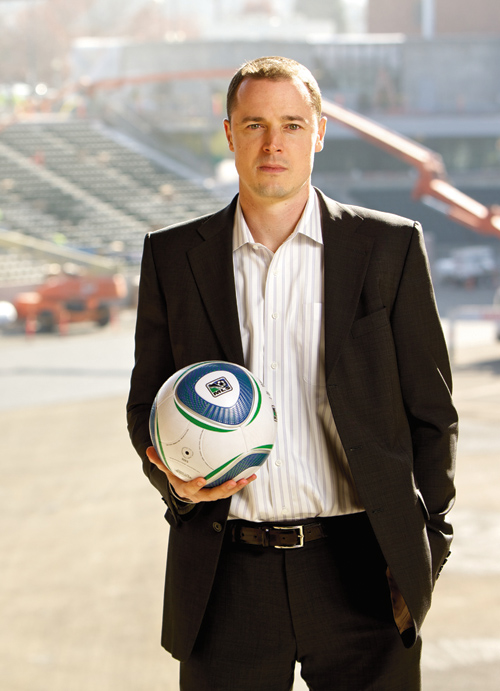 |
Timbers owner Merritt Paulson says his team will bring $30 million and 300 jobs to the local economy. |
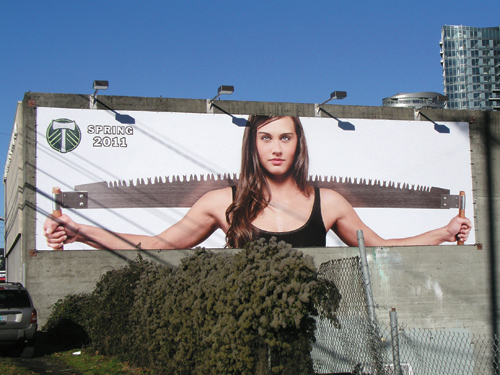 |
A massive billboard campaign created by Jelly Helm has generated considerable buzz since it debuted in late 2010. “We didn’t know it would be so popular,” says Timbers COO Mike Golub. |
Forging a connection with the community and making use of local talent is important to the Timbers, from bumping players up from the minor league 2010 team to creating the iconic billboard campaign. Jelly Helm, longtime friend of the Timbers and head of his own creative studio, was retained by the Timbers to help manage marketing efforts. What he brought was the We Are Timbers concept, a literally massive billboard campaign that’s generated plenty of buzz since it debuted in late 2010. “We didn’t know it would be so popular,” says Timbers COO Mike Golub. “People identify with it.” When the team offered fans the chance to pose with axes and chainsaws while Helm manned the camera, 1,500 people took them up on the offer, waiting as long as an hour and a half outside the Timbers store downtown.
The Timbers front office felt that outdoor advertising was the most cost-efficient, so they bought a lot of very big billboards. “We bought billboards in a concentrated way,” says Golub. “It feels like we’re everywhere, even though we’re not.”
It can be hard to judge the return on investment for billboards like these, but Golub says season ticket sales, jersey sales, social media buzz and corporate partnerships are all important metrics. Website traffic for the Timbers’ site, PortlandTimbers.com, was No. 1 in the league for December 2010 and January 2011, and season ticket sales have nearly sold out two months before the first home game, so the front office is happy with the billboards’ performance.
Some MLS teams, like the Los Angeles Galaxy, have to compete for those jersey sales and billboard spaces with other local sports teams. But like Portland, Salt Lake City has just one other professional sports team, the Utah Jazz, and one fairly new MLS team, Real Salt Lake, which has been part of the league since the 2005 season and won the MLS Cup in 2009. And its metropolitan area has nearly the same number of people living in it as Portland’s metro area: 2.2 million.
In 2008, the team moved from rented college football facilities to the brand-new Rio Tinto Stadium, which is of a similar size to the renovated Jeld-Wen Field, in Sandy, Utah, 25 minutes from downtown Salt Lake City. Having permanent digs allowed the team to go from signing single-year sponsorships to inking multi-year deals with a $35,000 minimum for the 2011 season. It’s made a difference for the suburb, too. Hosting the 2009 MLS All-Star game on a Wednesday night brought $3.5 million to local businesses, including restaurants, hotel and shops, according to Trey Fitz-Gerald, director of public affairs and broadcasting.
Fitz-Gerald, who has been with the league since its inception in 1996, admits that every team has a sophomore slump in ticket sales, which the Timbers are anticipating. “The looky-loos are curious, and then they figure out that this doesn’t fit into their lives,” says Fitz-Gerald. “Or they think, ‘That was cool, but do I really want to spend $500 to do it again?’” But he notes that with Portland’s four decades of soccer experience, phenomenal fan base, and the work of Timbers COO Mike Golub, “The Timbers may be the ones to break the slump.”

